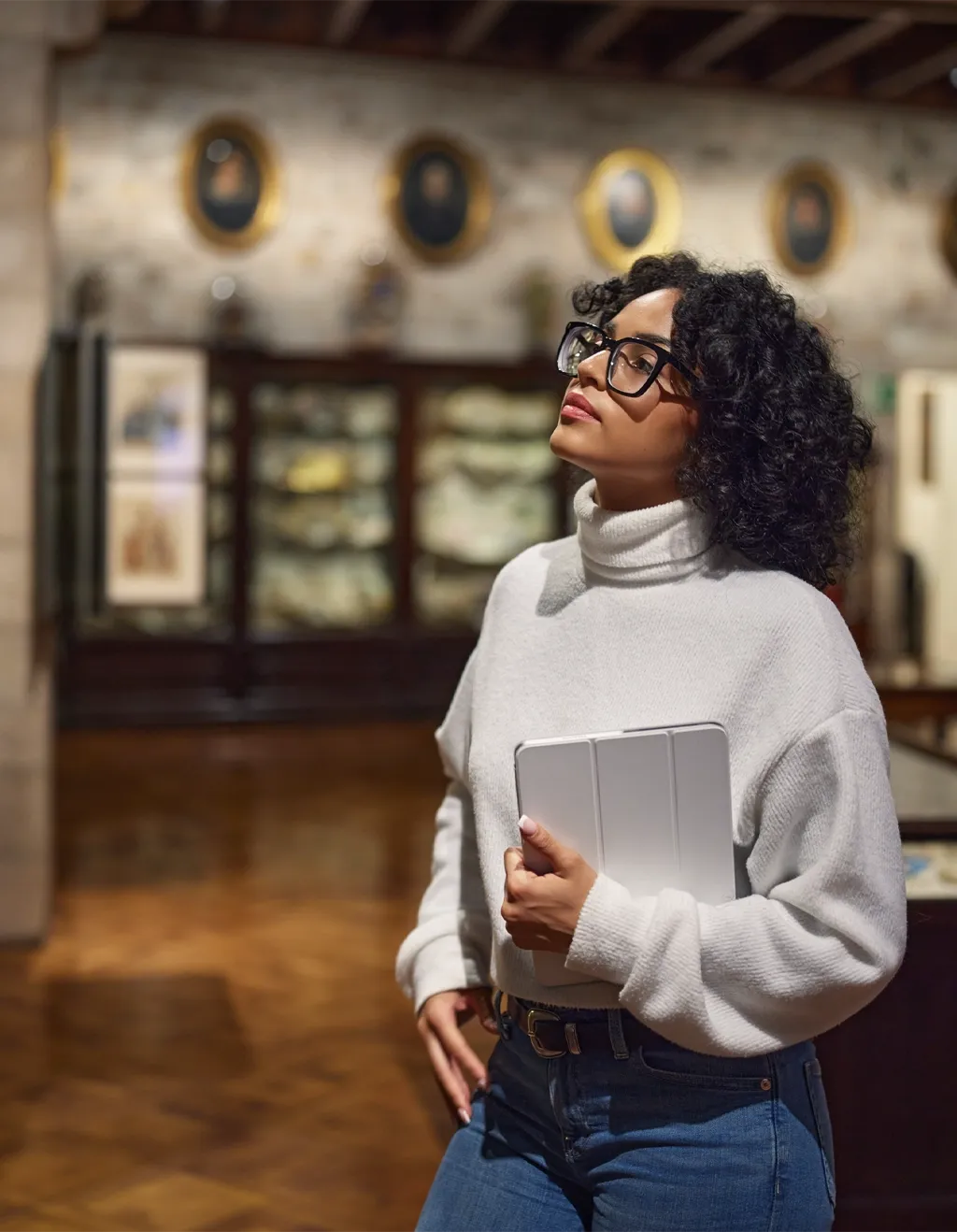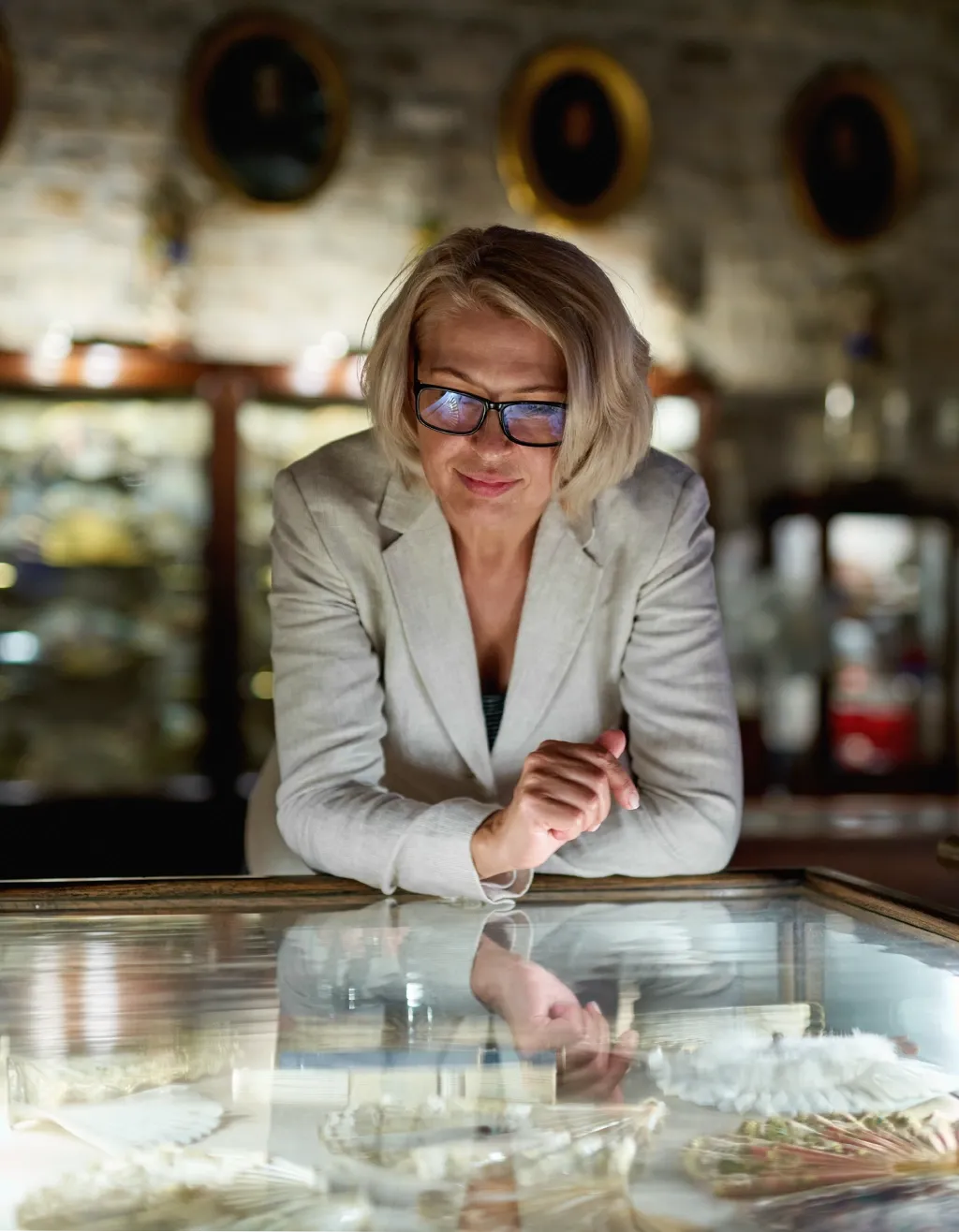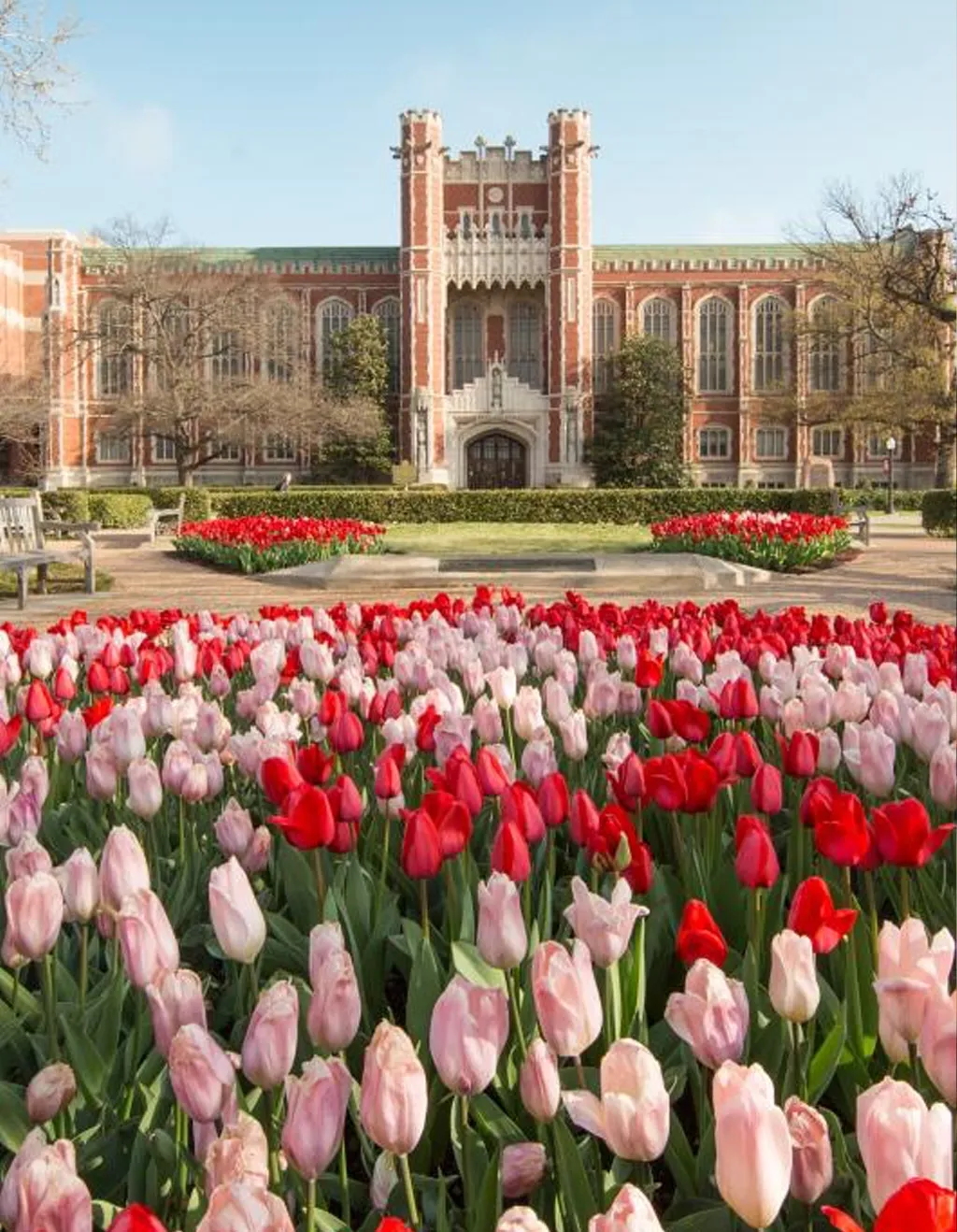Online Master of Arts in Museum Studies
Engage communities, preserve culture, and shape contemporary understanding
YOUR FUTURE STARTS HERE
Complete the form below to learn more about our online programs and how to get started.
The online Master of Arts in Museum Studies from OU Online equips students to tackle real-world challenges faced by museum professionals. The flexible curriculum covers museum management, budget planning, exhibition design, educational programming, and community engagement. Students can explore diverse topics and tailor the degree to match their career goals.
Learn from experienced faculty with active roles in museums across the country, including two AAM-accredited institutions at the University of Oklahoma—the Sam Noble Oklahoma Museum of Natural History and the Fred Jones Jr. Museum of Art.
20+ Months
33
10 to 20 Hours Weekly
Fall, Spring, Summer
The online Museum Studies graduate program delivers a strong return on investment. You will build the expertise needed to lead at the highest levels and pursue greater earning potential in the museum field.
Tuition and fees total $27,885 ($845 per credit hour). Costs for books and additional materials are not included.
YOUR FUTURE STARTS HERE
Complete the form below to learn more about our online programs and how to get started.
Museum professionals thrive on discovery. As stewards of global heritage, they connect the past with the present. As the museum field continues to evolve, innovate, and adapt, professionals must embrace new challenges and experiences to stay ahead of industry trends.
The OU Online master’s degree in Museum Studies is a 33-credit-hour program that offers a deep exploration of museum and gallery collections, including gallery interpretation and cultural heritage preservation.
Courses in leadership, community engagement, and object-based learning prepare you to guide visitors through the stories of the past, present, and future. Areas of study include museum collections, museum history and architecture, museum management, and more.
A master’s degree in Museum Studies from the University of Oklahoma positions you for advancement across a wide range of museum careers. This fully online program helps you build the leadership, communication, and curatorial skills needed to thrive in today’s evolving museum landscape. This program does not prepare students for careers in conservation. Graduates often accelerate their careers in roles such as:

OU’s online Museum Studies master’s degree prepares students to meet the growing demand for adaptable, skilled museum professionals ready to lead in a dynamic industry. Graduates of the program will be able to:
The museum studies master’s program offers a comprehensive foundation in essential areas of the museum field, including leadership, education, community engagement, history, and emerging technologies.
Earn 33 credit hours across 11 courses, including core courses, electives, a research methods course, and an independent project. Take two courses per semester, with Spring and Fall courses running 16 weeks and Summer courses 14 weeks.
Most courses are fully asynchronous, with a few offering optional live sessions every other week. Expect a weekly time commitment of 10 to 20 hours for two courses.
Credit Hours: 3
Baseline course introducing all aspects of museums and museum careers including history, structure, operations, and theoretical underpinnings.
Credit Hours: 3
This course will consider the place of collections in the life of a museum; how collections mesh with the museum mission; collections policies and stewardship. It will relate theoretical ideas on collection development and maintenance to the actualities of museum situations.
Credit Hours: 3
The capstone is the comprehensive, end-of-program course where students engage in a project that applies the knowledge and skills learned in the program to professional topics. Under the supervision of the course instructor, the student will select a topic and project design. Projects may include, for example, in-depth literature reviews, research studies, or exhibit designs.
Credit Hours: 3
Field experience directly related to study focus in the Museum Studies program. Requirements include some combination of journal, progress reports, written summary of experiences, or academic paper, and a possible comprehensive examination over these materials.
Credit Hours: 3
Examination of the house as a museum. Topics include identifying historical significance and architecture, conservation and interpretation, and developing community involvement.
Credit Hours: 3
Introduction to museum education, including object-based learning environments, and theory, an understanding of which fosters the development of effective motivating educational programs in museums.
Credit Hours: 3
It is crucial that the museum professionals are acquainted with some of the most controversial exhibitions historically, as well as the ones from the 1990s along with an important discussion of the external legal, political, financial, and social forces that are crucial in influencing the course and the outcome of the examined cases.
Credit Hours: 3
An examination of federal laws that impact decision-making for museum professionals. Course activities include the critique of museum collections and policies relating to federal laws such as the Archaeological Resources Protection Act, National Historic Preservation Act, Convention on Cultural Property Implementation Act, Native American Graves Protection and Repatriation Act (NAGPRA), and The Bald and Golden Eagle Protection Act.
Credit Hours: 3
In-depth study of the philosophy, policies, and practices of museum governance, including such topics as ethics, board development, institutional mission and organization
Credit Hours: 3
Introduction to the theory and application of information technologies within museums including hardware, software, and the application of technology to the work of museum professionals.
Credit Hours: 3
Methods of investigating museum studies problems; use of evaluation in planning for continuous quality assessment and improvement of museum policies, processes, and procedures; developing original research designs; evaluating research studies in museum topics.
Credit Hours: 3
Introduction to the field of historic preservation, including identification, documentation, and presentation of historic buildings, sites, and structures.
Credit Hours: 3
Introduction to the history and nature of small museums in the United States. Topics include cultural significance, administration, finance, funding, staffing, program/exhibition development, community involvement, and partnership building.
Credit Hours: 3
Introduces museum interpretation as a mode of communication to solicit informational experiences and inspire curiosity about a topic via media such as physical exhibits, educational programs, interactive designs, and virtual access. Given current demands for broader demographic inclusivity, the course also revisits conventional museum domains on who interprets what, with which sociocultural and ethnic background representing which segments of society.
Credit Hours: 3
Designed for students to understand the representational history of native cultures in museums and the dynamic collaboration between a museum and a culture to accomplish an authentic and respectful presentation today.
Credit Hours: 3
Topics offered under this course number will include but not be limited to education and public programs; legislation and museum policies; exhibitions; museum stores, volunteers, and associations.

OU Online delivers high-quality, affordable graduate programs in a flexible, fully online format from a top-tier public research university. The MA in Museum Studies equips you with the tools to solve real-world challenges in the museum field. Apply your knowledge through hands-on internship opportunities that connect theory with practice.
The master’s in museum studies is built on the foundation of world-class University of Oklahoma faculty, mixed with professors of practice providing valuable instruction. By linking industry experts with our online programs, we offer the most advanced curriculum and prepare students for future career success.
OU Online offers robust student support services, including academic support, online tutoring, mental health counseling, and an online career development center. The program accommodates the needs of working professionals, allowing you to expand your technical skills while maintaining full-time employment.
With more than 250,000 alumni across the world, becoming a Sooner means you’ll have access to a strong network of museum professionals to accelerate your career. As a Sooner, you’ll be part of a powerful network of leaders working in organizations across the world, helping you expand your career as a museum professional.
The master’s in museum studies is offered in a fully online, flexible format designed for working professionals around the world. Earn your degree in as few as 20 months while managing full-time work and personal commitments. Study from anywhere and build specialized expertise in museum leadership and management.
Move through the program with a small, focused cohort of professionals who share your passion for museum leadership. Participate in dynamic online discussions with faculty and peers while building a strong professional network and developing the skills to thrive in the museum industry.

Earning your MA in Museum Studies is an investment in your future—and OU Online is committed to making that investment accessible and transparent.
Students pay $845 per credit hour*, totaling $27,885 for the full program. Costs for books and additional materials are not included.
Financial aid, scholarships, and employer tuition assistance may be available to help reduce your out-of-pocket expenses. OU’s dedicated financial services team will support you through every step of the funding process, so you can stay focused on your education and career goals.
For questions about financial aid for your online program, contact the Online Aid office at onlineaid@ou.edu or call 405-325-2929.
A nonrefundable deposit of $350 is required upon admission to secure your place in the program. This deposit guarantees your spot in your first semester of courses and will be applied toward your first semester’s tuition.
* Please be aware that tuition and fees may change, as determined by the Oklahoma State Regents for Higher Education.
This program accepts a maximum of 6 credit hours of graduate-level transfer credit, as per Graduate College policy, with the approval of the department. You must inform your Enrollment Coach of your interest in transferring credits during the application process.
YOUR FUTURE STARTS HERE
Complete the form below to learn more about our online programs and how to get started.